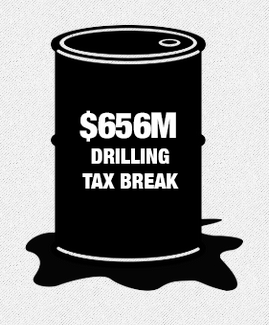- Blog
- Food & Agriculture
- The trade-off of fossil fuels’ billions in subsidies
The trade-off of fossil fuels’ billions in subsidies

Donate Now!
Your contribution will benefit Friends of the Earth.
Stay Informed
Thanks for your interest in Friends of the Earth. You can find information about us and get in touch the following ways:
Here are a couple of things to keep in mind today as President Obama sends his budget to Congress:
Most Americans believe that our air should be clean, that college should be cheap, and that disadvantaged children should have food and preschool. Even at a time of unprecedented partisanship, government spending that supports these goals remains solidly popular.
No one can say the same about the billions in subsidies that U.S. taxpayers send to Big Oil every year. Considering that this money amounts to welfare for some of the richest companies that have ever existed, it is no surprise that decisive majorities of Democrats, Republicans, and independents all oppose them.
And yet, there is a disconnect between how the public feels and how Congress acts. A major one.
This mismatching of budget priorities is why Friends of the Earth and a coalition of 13 other groups joined together to launch the fossil fuel subsidies tradeoff calculator.
This online tool allows users to compare the cost of giveaways to Big Oil to the cost of much needed — and much liked — social programs, such as food stamps, Pell grants, healthcare for veterans and many others. The idea is to show in simple, visual terms that oil and gas subsidies do not just prolong our dependence on dirty fuels; they also deprive programs that actually help people of much needed funds.
Take, for example, a tax break for domestic manufacturers that President George W. Bush signed into law in 2004. Originally it was supposed to protect businesses that actually build things from outsourcing pressures, but the bizarre list of eligible companies includes software designers, architects, and movie producers. Somehow Big Oil is on the list too, and that eligibility cost taxpayers $656 million last year alone.
If Congress decided to plug this loophole, 114,485 students could receive Pell grants, 20,796 park rangers could be hired, and 221,622 combat veterans could receive medical care. Drawing a sharp line between these trade-offs forces us to ask ourselves, where do we want our tax dollars to go? Towards carbon pollution and fossil fuel dependence, or towards basic social priorities?
This is the question to keep in mind when examining President Obama’s proposed 2016 budget. To its credit, similar to previous years this budget calls for raising revenue by ending the worst giveaways polluters. But the power of the purse still lies with Congress—the same Congress that took over $60 million from fossil fuel interests in the last election and just voted to approve the Keystone XL pipeline.
Image preview, above: The domestic manufacturers tax break amounts to $656 million dollars of subsidies to the oil industry per year.

